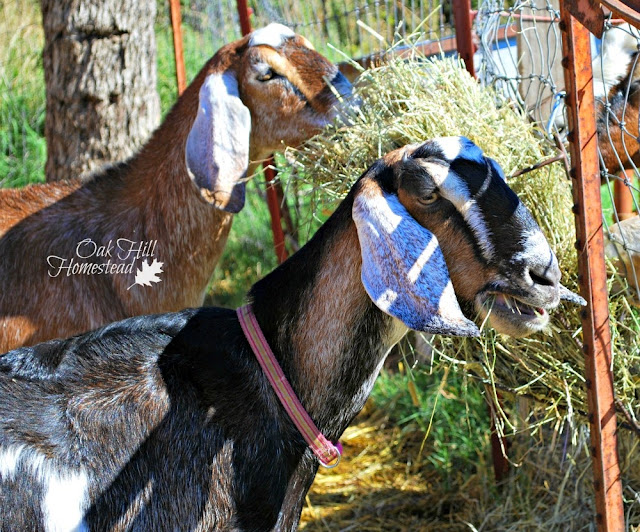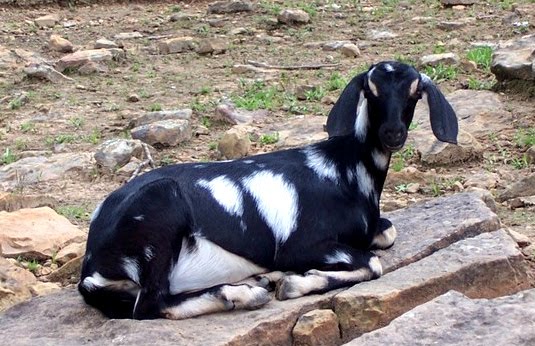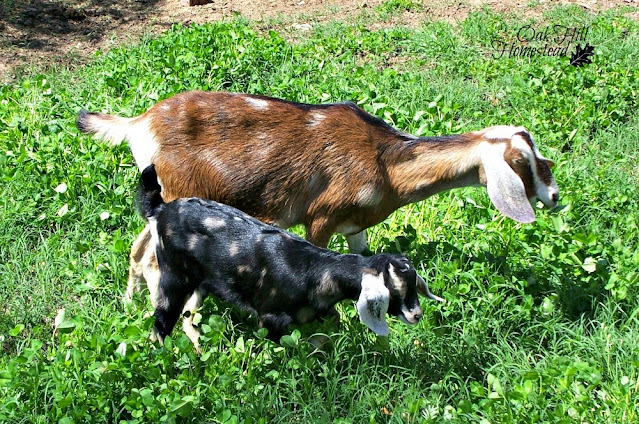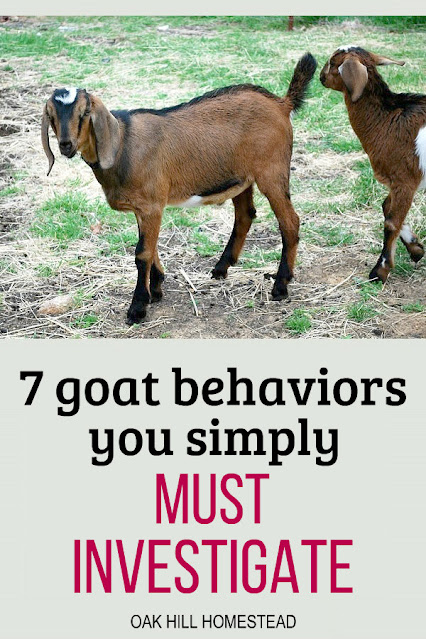Goats have some pretty quirky behaviors. How do you know if that's normal goat behavior or if there's something wrong with her? This list of normal and abnormal goat behavior characteristics will help you know whether or not you should be worried by your goats' behavior.
Is that normal goat behavior?
Do you know the difference between normal and unusual goat behavior? How would you know if something is wrong with your goat?
The answer is observation, and knowing what is normal and usual for your goats.
If you are a relatively new goat owner, here are a few things that might concern you when you see them for the first time, plus a list of behaviors that could signal a serious condition and might require medical intervention.
Normal goat vital signs
First let's establish what the normal vital statistics are for goats.
Temperature = 102.5°F - 104°F. A goat's normal temperature can vary depending on the temperature of the goat's surroundings and time of day. It's a good idea to take a second goat's temperature for comparison.
Pulse rate = 70 - 80 beats per minute
Respiration = 15 to 30 per minute
Normal rumen (stomach) movements = 1 - 1.5 per minute
Normal physical characteristics
Bare spots on knees and chest
Goats often have bare patches on their front "knees." These are callouses.
If you've watched your goat lie down, you've noticed that they sort of flop down on their knees and then lower the rest of their body to the ground. This results in wear on the skin and causes callouses.
Some goats also develop a callous on their chest between the front legs. Again, this is from lying on the ground. These callouses are normal in goats.
Body condition
Dairy does tend to be thin while they are lactating, whether they are raising kids or being milked.
They put all the calories from their feed into producing milk instead of into maintaining their body weight. Goat breeders call this "putting it all in the bucket."
A good way to check your goat's body condition is to feel the breastbone, between the front legs.
You should be able to feel a layer of fat over the bone. If all you feel is the bone, increase your doe's feed (do so gradually to avoid digestive upset).
Your goat needs a high protein feed and good quality hay while she's producing milk.
Udder
A dairy goat has one udder and two teats.
Some does will have a lopsided udder, which is usually caused by the kids nursing one side and not the other. This happens more often when she is raising a single kid.
You can milk the neglected teat to keep her udder "even."
A lopsided udder can also mean mastitis. Other signs of mastitis are a very hard udder, heat in the udder, and the doe acting "off." Her udder will be tender if you try to touch it.
Dewclaws
Older goats can have long dewclaws, those horn-like growths on the back of their legs above their hooves.
Dewclaws can be trimmed when you trim their hooves, just like fingernails. If you don't trim them, they'll peel off eventually on their own, similar to a dog's toenails.
Long dewclaws are nothing to worry about.
Are these goat behaviors normal?
Kicking her kids away
When the doe decides that her kid should be eating more solid food and nursing less, she will discourage the kid from nursing, sometimes by kicking it away, running away, or even lying down on the ground.
She hasn't rejected her kid, she's simply encouraging it to grow up. It's just an instinctive behavior for a nursing goat.
However, if the kid is young (newborn up to about a week old) and the doe won't let it nurse, there is something wrong. She might have mastitis, or she may indeed have decided to reject her kid.
Not allowing a young kid to nurse is not normal.
Chewing cud
Goats begin chewing cud when they start eating hay as kids.
You might witness your goat regurgitating her cud, or notice a "wad" in her cheek like chewing tobacco.
Sometimes they burp to release the gasses building up in the rumen, where their food is fermenting. It smells, too!
This is normal. Chewing cud is a sign of good digestive health.
However, foaming at the mouth is not normal.
Sucking on the fence
I'm not even sure what to call this unusual behavior quirk.
Some goats like to suck on wire fencing. It's almost as if they are "flossing their teeth."
Not all of my goats have done this, but a few of them do it regularly after finishing their supper.
Standing at the fence, the goat puts her mouth on a strand of wire and moves her head back and forth so that the wire slides through her mouth.
I have no idea why some of them do this. Maybe it's just a habit, like a horse that cribs from anxiety or out of boredom.
Since I've had several do it over the years, I guess it's "normal." Well, it's nothing to worry about anyway. Just one of those "quirky" behaviors that goats have.
No, goats can't eat everything
Contrary to what you've seen in cartoons and old TV shows, goats have sensitive digestive systems.
They don't eat license plates or tin cans, and when you change their feed, you must do it gradually.
They can't eat anything and everything, although some of them want to try. Mine will snatch a piece of paper right out of my hand and down the throat it goes.
If your goat eats something she shouldn't - such as the gardening glove you laid down just for a second, or the nipple from the bottle baby's feeding - keep an eye on her for a day or two to make sure her digestive system is working as it should.
Diarrhea or constipation and unwillingness to eat are signs of trouble.
Goats don't particularly like grass
Goats don't graze like horses, they'd rather browse like giraffes, and they prefer weeds, brush, tree leaves and bark over grass.
In fact, a goat can starve in a field of grass. While some are more willing to eat grass than others, they would all prefer to browse on low-hanging tree limbs, shrubs and weeds.
Here is a list of plants that are toxic to goats.
So if your goat refuses to eat grass, this is normal behavior. If this is the case, make sure your goat has plenty of good quality hay to eat.
Abnormal behavior - you DO need to investigate these
Any kind of behavior that is unusual for your goat calls for a second look.
This is why knowing your own goat's normal behavior is important. That's your baseline, and that's how you'll know that something is "different."
The only way to know what's normal for your goats is to spend time with them and observe them.
If you do notice something unusual, keep an eye on the affected goat.
You might need to call your vet for some of these conditions - actually, I encourage you to call your vet any time you have a question about your goat.
Any goat that won't eat has a problem
If your goat is nibbling at hay but turns up her nose at grain, she has a problem, and a bottle-fed kid that doesn't want a bottle has a problem.
They're not "just not hungry." There is something wrong.
Once you've ruled out mouth problems - such as burrs in the soft tissue, or blood from a tooth or other injury - you'll need to take her temperature and look for additional symptoms.
Does she have diarrhea? Is her rumen making normal noise and movements, and how many movements per minute can you detect?
Is she unwilling to move? Does she look bloated?
This goat is in trouble and needs treatment ASAP. Call your veterinarian for help.
A goat that stands off from the herd
A goat that stands off by herself or won't come out of the goat shelter needs a second look.
Goats are social creatures and they do better when you have at least two.
Being off by herself can signal an injury or illness. Perhaps it hurts to walk, for instance.
My goat Wish refused to come out of the goat shed at feeding time when she had pinkeye. The sunshine hurt her eyes.
It's not normal for a herd animal to stay away from the herd. You need to figure out why she's acting out of character.
A goat that's crying or bawling
A crying, bawling or screaming goat should be investigated. She has a problem and it could be urgent. She might be scared, being chased by something, stuck in the fence, or in pain.
On the other hand, if your normally noisy and friendly goat is quiet and anti-social, you also need to investigate.
However, a goat in heat will often bawl. Knowing your goat will help you figure this one out, but please investigate to make sure she isn't stuck in the fence or worse.
Foaming at the mouth
A goat that is foaming at the mouth has a problem. This is a sign of frothy bloat, which can be caused by eating lush, damp forage such as clover, alfalfa and others.
Frothy bloat is more dangerous than dry bloat, and can result in death rather quickly. This goat needs help.
Standing with his or her back hunched up
A goat that looks hunched up should be investigated. This could be a serious problem.
There can be several causes: the goat might be cold, have an intestinal or digestive problem, or if it's a buck or wether, he might have urinary calculi.
Another sign of urinary calculi
A buck or wether who is unable to urinate has a serious problem.
You might notice him straining with no results. I once had a young buckling that strained, cried, and rolled on the ground in pain. That was an obvious problem, but the signs can be more subtle too.
If you suspect a urinary blockage, you need to get help for this goat immediately. This can be a life-threatening situation.
Unusual poop
Your goat's poop can tell you a lot of things. Normal, healthy goats should produce "berries," separate "nuggets" that do not clump together.
A soft clump of poop might look like berries stuck together, or it might be one soft mass. This can mean anything from eating a weed the goat wasn't used to, a bit too much grain, or perhaps intestinal parasites.
If you have several goats it can be hard to tell which one is responsible for clumpy poop. Keep an eye on the whole herd until you figure out which goat is affected.
Usually soft, clumpy poop doesn't last long, but if the condition persists you should investigate more closely.
Watery diarrhea is more serious than soft poop
It's usually easy to see which goat is affected by diarrhea. Check each goat's hind end until you find the culprit.
Diarrhea may or may not be caused by coccidiosis and is especially serious in young kids. Call your vet if your goat is suffering from diarrhea, especially if it is severe.
Checking for parasites
Look at your goats' gums and eyelids to check for a parasite infestation. The tissues should be a healthy pink color, not pale pink or white which would indicate anemia caused by a heavy parasite load.
Research the famacha method for more information on checking goats for parasite infestation.
Parasites are a serious issue in goats. A heavy parasite can result in a goat's death.
Follow up on unusual behavior
Anytime you notice your goat acting out of character you should investigate.
Hopefully it's nothing serious, but it's better to check out the situation than to be sorry that you didn't.
Are you looking for more goat information? You'll find all of my goat-related posts here: What You Need to Know about Goats.
As a goat lover and a homestead gardener, I'm excited to also share my gardening tips with you - from planting seeds to enjoying the fruits (and vegetables) of your labor! You can find my gardening advice and insights right here, so let's dig in and cultivate some fresh, delicious produce together.
For more homesteading and self-sufficient posts like this, subscribe to my weekly-ish newsletter, The Acorn and join me on Facebook, Instagram and Pinterest. I'd love to see you there!
~~~~~
My mission is to inspire and encourage you to live a simple, joyful life,
no matter your circumstances or where you live. Join me here:
Facebook | Pinterest | Instagram | Subscribe


















